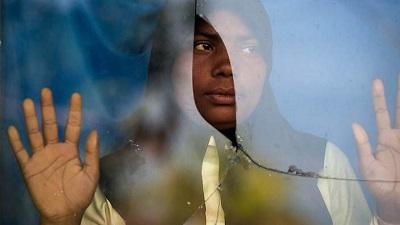You are here
- Home
- Year of Mygration
- Day 248, Year of #Mygration: Refugees and Mental Health - Should I stay or go back to Syria?
Day 248, Year of #Mygration: Refugees and Mental Health - Should I stay or go back to Syria?

In today’s post, Dr Sharif Haider (Lecturer, Social Work, Faculty of Wellbeing, Education and Language Studies, The Open University) discusses mental health among the refugee community. He urges us to refrain from labelling refugees experiencing mental health issues. He further argues for consideration of unconscious bias among the health care professionals.
‘Should I stay or should I go?’ Faez asked me. I did not know what to say. Going back to Syria is an option but I was not sure whether it is safe for him to go back. He thought things are getting better in Daraa which is a southern Syrian city. However, I am pretty much sure the way things have been materialising in his life he could potentially end up in an acute psychiatric hospital. As an approved mental health professional (AMHP), I could see the way all his mental health needs were recorded and acted upon by a range of professionals it is a matter of time before he would be detained by an AMHP under the Mental Health Act 1983.
It is always a difficult decision for an AMHP to go against two psychiatrists’ recommendations for civil detention but I had to do that because I was not convinced that what nurses, housing officers, neighbours, police officers, and even his GP were saying. In this blog, I will try to sketch Faez’s story and his journey briefly through the English mental health systems.
His mental distress started when he came to England from Jordan. When he arrived, he began to have nightmares and flashbacks of war. His GP straight away referred him to a psychiatrist who, without hesitation, gave him a label, PTSD (post-traumatic stress disorder).
Cognitive behaviour therapy (CBT) was sought to rescue him with Paroxetine medication. He refused to take medication due to its side effects like a headache, insomnia, and nausea.
After a long wait he managed to receive CBT but after two sessions he disengaged as it was not helping him. Rather, it increased his anxieties and made him feel angry about his circumstances. He wanted something concrete and practical which would occupy him meaningfully, for example, a job in accounting as he is a charted accountant, qualified and practised in Syria. However, no one asked him the reason why he disengaged and no one even paid a visit to check his well-being.
He does not have anyone in the UK, nor does he know anyone; he was not willing to mix with people who are from Syria because that reminded him of the war and forced displacement, so, he kept himself in his flat and only went for shopping and prayers.
One day on his way back from the mosque, a group of teenagers called him a ‘terrorist’ due to his beard and Islamic dress. Later on that day they threw stones and bricks at his flat. It went on for nine months and the police became involved but unable to do anything which made him angry. He then confronted the group and assaulted one of the boys who made him feel unwanted in the housing estate. Bullying, name calling and posting threatening notes through his letterbox were a few activities a few teenagers were involved with that made him angry so that he lashed out and became verbally and physically aggressive towards them and neighbours.
Their behaviour made him more anxious and he was worried about his life. He recognised that his actions made matters worse as neighbours called him a ‘nutter' and made regular phone calls to the police and local authority for a mental health assessment.
According to him, he did all this out of frustrations. It was clear that his neighbours did not want him which reflected in their testimonies to the police and local authority. Undoubtedly, the neighbours provoked him and he responded with frustration and anger. His irrational, unpredictable, erratic, angry and disengaging behaviour earned him another mental health label called personality disorder.
Interestingly, none of the professionals made an effort to ask his views and thoughts about all these events; undoubtedly language barriers did not help the situation either. When I assessed him, I felt he had health needs but not to the extent the professionals had recorded and perceived. Naturally, I asked the question ‘why?'.
After spending time with him and going through his records, I concluded that professionals did not spend enough time listening to him. They relied on each other's reports and comments without checking their validity and accuracy; they saw him as a Syrian refugee and his mental health diagnosis first rather than a human. No one dared to check the validity of those diagnoses, let alone challenge them. They provided him with off the shelf services without considering their appropriateness and even when he disengaged no one bothers to check his well-being. No one considered and explored his social, environmental and economic conditions. He became invisible in the system until his neighbours made noises and wanted him to be deported. All of them failed to understand his living conditions as a Muslim refugee from Syria.
Faez wanted to be part of his adopted country, had a dream and aspiration to contribute but systems have already put him in negative boxes from the start of his life in England. He does not think he can remove himself from those boxes because the systems are more powerful than him. So, he is planning to move out from those boxes by returning to Daraa.
Quarterly Review of Research
Read our Quarterly Review of Research to learn about our latest quality academic output.

Contact our news team
For all out of hours enquiries, please telephone +44 (0)7901 515891
